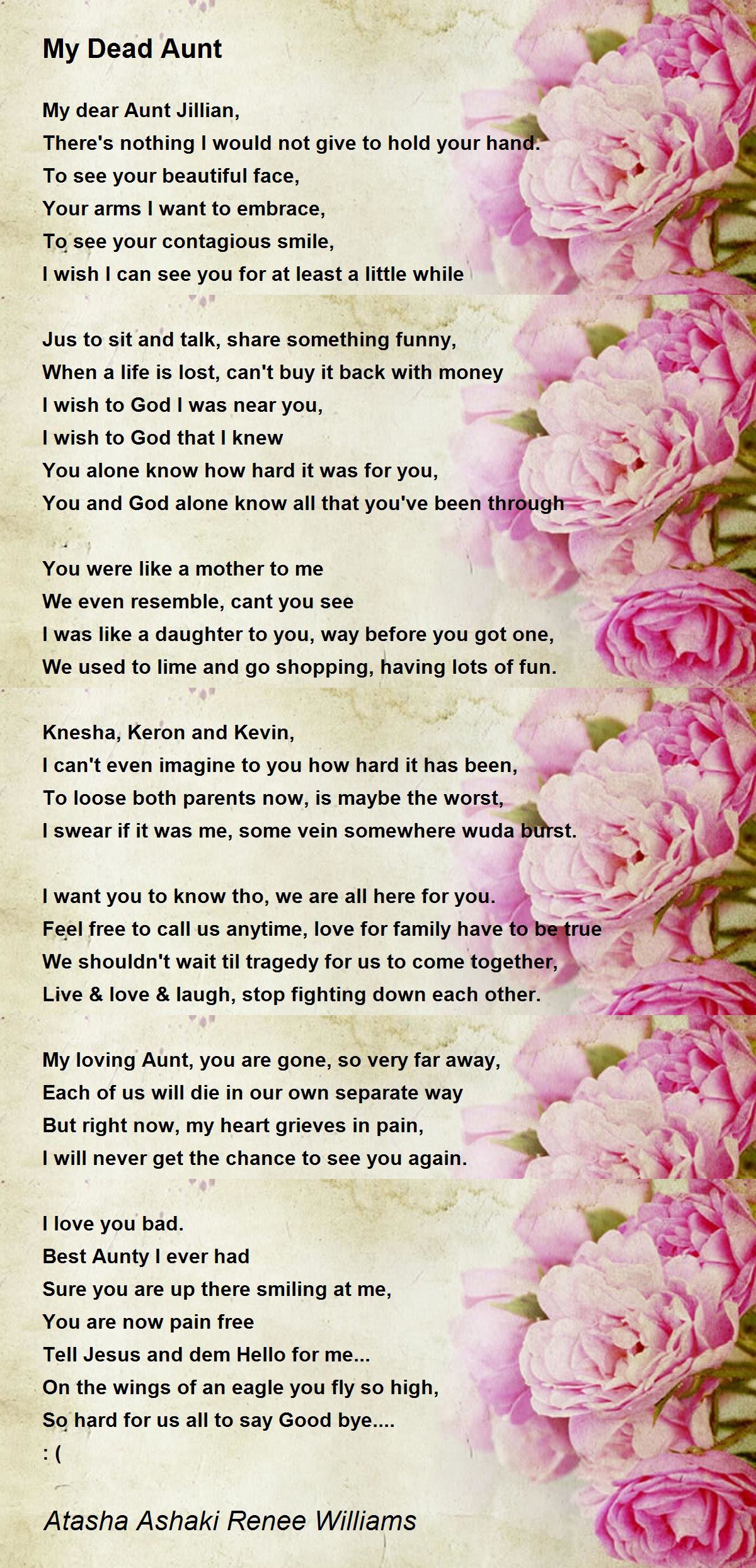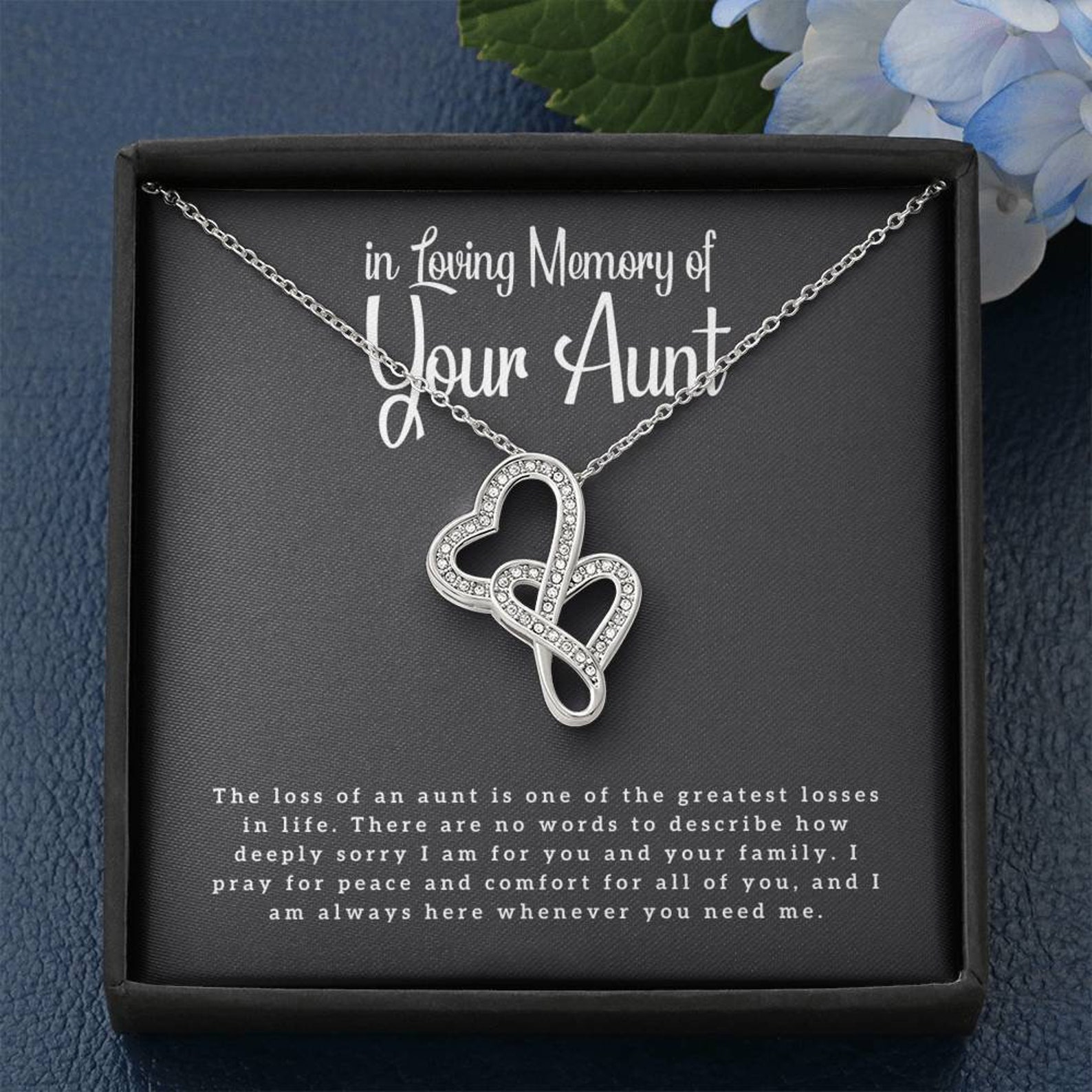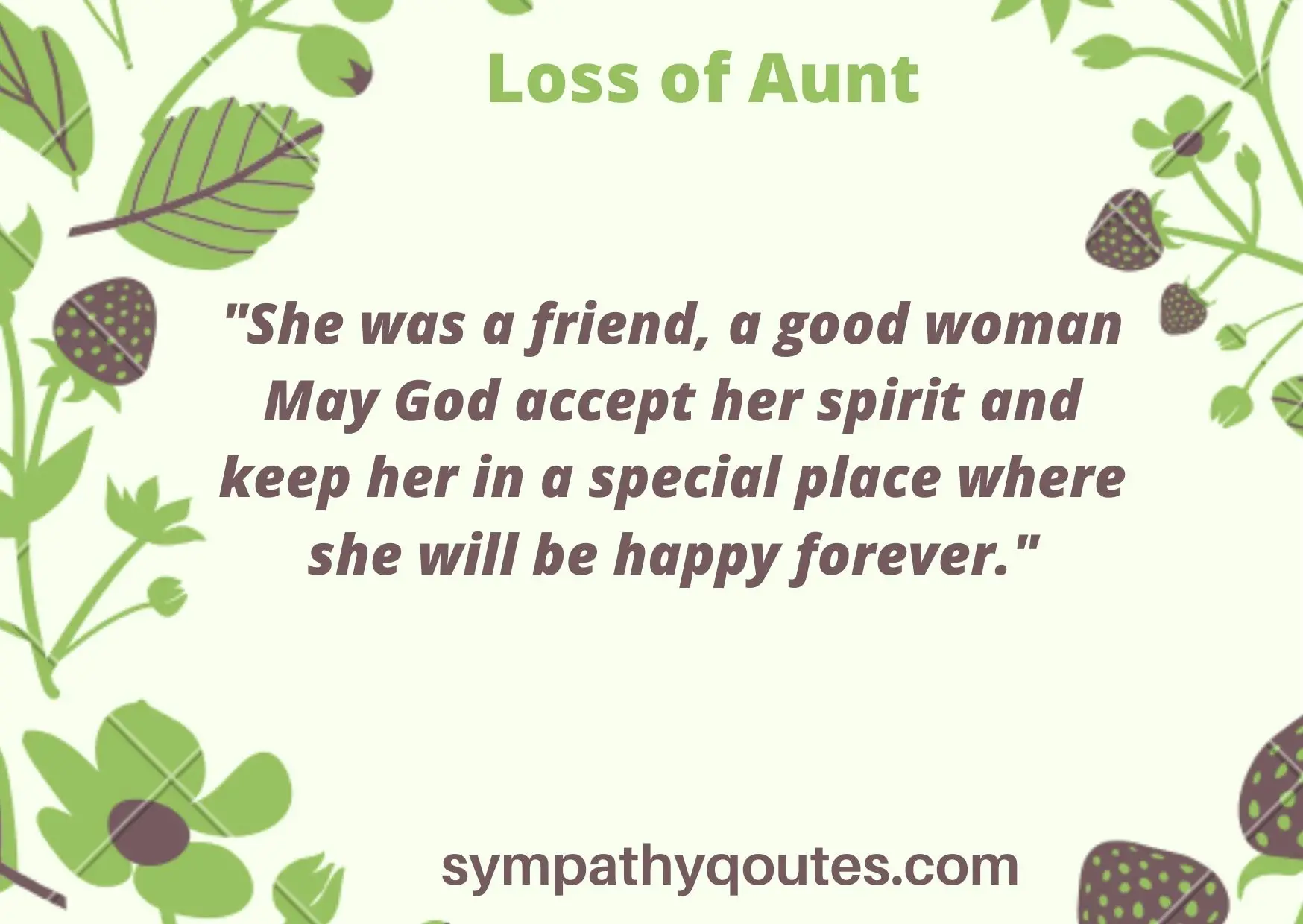Losing a loved one is never easy, but the loss of an aunt can feel particularly devastating. She might have been your confidante, mentor, or simply someone who made life brighter. The void she leaves behind can feel overwhelming, but remember, healing is possible. This article will walk you through the emotional journey and provide practical tips to help you navigate this challenging time.
We all go through tough times, and losing someone close to us is one of the hardest experiences anyone can face. Whether your aunt was more like a second mom or just a cherished family member, her passing leaves a mark that takes time to heal. But here's the thing—this pain doesn't have to define you forever. Instead, it can shape who you are in meaningful ways.
Let’s talk about how we can honor the memory of our aunts while finding peace within ourselves. From coping strategies to building lasting memories, this guide has got you covered. So grab a cup of coffee or tea, and let's dive into this together. You're not alone in this, and we'll get through it step by step.
- Dermawhite The Ultimate Guide To Understanding What It Does And Why It Matters
- Microneedling Pen Vorher Nachher Results Thatll Blow Your Mind
Understanding the Emotional Impact of the Loss of Aunt
When your aunt passes away, it's normal to feel a whirlwind of emotions. Grief is complex, and everyone experiences it differently. For some, it might hit like a tidal wave, while others may feel numb at first. What matters most is acknowledging those feelings without judgment. It's okay to cry, it's okay to laugh at old memories, and it's okay to take your time.
Why the Loss of Aunt Feels So Different
Your aunt wasn't just another family member; she likely played a unique role in your life. Maybe she was the one who always had advice when you needed it most or the person who made family gatherings extra special. Losing her means losing a piece of your support system, and that's why the grief feels so distinct. Here's what makes her loss stand out:
- She bridged generations, connecting you with both your parents and grandparents.
- She often acted as a mediator or peacemaker in family conflicts.
- Her presence brought joy, laughter, and comfort to many family moments.
Recognizing these roles can help you understand why her absence feels so profound. It's not just about losing her—it's about losing the connection she provided to the rest of your family.
- Diy Hat Bar Your Ultimate Guide To Crafting Your Own Fashionable Hats
- Naughty Santa Drink The Festive Treat Thatrsquos Naughty But Nice
Stages of Grieving the Loss of Aunt
Grieving isn't linear, but there are common stages people tend to experience. Knowing these stages can help you make sense of your emotions and realize that what you're feeling is normal.
Denial and Shock
At first, you might struggle to accept the reality of her passing. Denial is a natural defense mechanism, giving you time to process the news. You might find yourself thinking, "This can't be real," or replaying moments leading up to her death. That's okay—it's part of the journey.
Anger and Bargaining
As the initial shock wears off, anger might set in. You could question why she had to leave or even feel frustrated with yourself for things left unsaid. Bargaining often follows, where you might think, "If only I had done something differently." Remember, these thoughts are normal, but they don't define you.
Sadness and Depression
Eventually, the weight of sadness sinks in. This stage can feel heavy, but it's also where healing begins. Allowing yourself to feel this sadness is crucial. Don't push it away—let it flow, and know that it will pass with time.
Acceptance and Moving Forward
Acceptance doesn't mean forgetting; it means embracing the new reality without her. This stage allows you to find peace with her passing and start rebuilding your life. It's about creating a new normal while keeping her memory alive.
Coping Strategies for the Loss of Aunt
Now that we've explored the stages of grief, let's talk about practical ways to cope. These strategies won't erase the pain, but they can help you manage it better.
Talk About It
Sharing your feelings with friends, family, or a therapist can be incredibly healing. Sometimes, just saying the words out loud can bring relief. Don't be afraid to open up—it's a sign of strength, not weakness.
Lean on Your Support System
Your support system includes the people who care about you. Whether it's family, friends, or support groups, don't hesitate to lean on them during tough times. They can offer a listening ear, a shoulder to cry on, or simply a distraction when you need it most.
Create a Tribute
Honoring your aunt's memory can be a beautiful way to keep her close. Consider creating a scrapbook of photos and memories, planting a tree in her honor, or even writing letters to her. These acts can provide comfort and a sense of connection.
Building Lasting Memories
Memories are what keep our loved ones alive in our hearts. Here are some ideas to preserve the legacy of your aunt:
- Compile a photo album or digital slideshow of your favorite moments with her.
- Write down stories or lessons she taught you that you want to pass on.
- Visit places that were meaningful to her or that you shared together.
These memories can become a source of strength and joy as you move forward. They remind you that her love and influence continue to live on through you.
When to Seek Professional Help
While grief is natural, it's important to recognize when it's becoming overwhelming. If you find yourself struggling to function in daily life or experiencing prolonged depression, it might be time to seek professional help. Therapists and counselors specialize in guiding people through grief and can offer valuable support.
Signs You Need Help
- Difficulty sleeping or eating
- Feeling disconnected from others
- Thoughts of self-harm or suicide
- Constantly feeling numb or empty
Remember, asking for help is a sign of strength, not weakness. There's no shame in reaching out to someone who can provide the guidance you need.
Resources for Grieving the Loss of Aunt
There are plenty of resources available to help you navigate this difficult time. Here are a few you might find useful:
- GriefShare: A support group network for people grieving the loss of loved ones.
- BetterHelp: Online therapy platform offering grief counseling.
- CDC Mental Health Resources: Information on mental health and coping strategies.
These resources can provide additional support and guidance as you work through your grief.
Self-Care During Grief
Taking care of yourself is essential during this time. Grief can be physically and emotionally exhausting, so prioritizing self-care is crucial. Here are some tips:
Physical Self-Care
- Get enough rest, even if it's just short naps.
- Eat nutritious meals, even if you're not hungry.
- Stay hydrated—it's easy to forget when you're grieving.
Mental and Emotional Self-Care
- Practice mindfulness or meditation to stay grounded.
- Engage in activities that bring you joy or relaxation.
- Write in a journal to process your thoughts and feelings.
Self-care might feel like the last thing on your mind, but it's vital for your well-being. Treat yourself with kindness and patience as you heal.
Finding Meaning in the Loss of Aunt
As painful as it is, losing someone can also lead to personal growth. Many people find meaning in their grief by reflecting on the lessons their loved ones taught them or the impact they had on others. Ask yourself:
- What qualities did my aunt embody that I want to carry forward?
- How can I honor her memory in my daily life?
- What legacy did she leave behind?
These reflections can help transform your grief into something positive and constructive.
Conclusion: Moving Forward with Love and Memory
Losing an aunt is undeniably hard, but it doesn't have to define you forever. By understanding the stages of grief, using coping strategies, and preserving memories, you can find peace and continue living a fulfilling life. Remember, it's okay to grieve—it's a testament to how much she meant to you.
We invite you to share your thoughts or experiences in the comments below. Your story might inspire someone else going through the same journey. And if you found this article helpful, don't hesitate to share it with others who might benefit from it. Together, we can support each other through the highs and lows of life.
Table of Contents
- Understanding the Emotional Impact of the Loss of Aunt
- Stages of Grieving the Loss of Aunt
- Coping Strategies for the Loss of Aunt
- Building Lasting Memories
- When to Seek Professional Help
- Resources for Grieving the Loss of Aunt
- Self-Care During Grief
- Finding Meaning in the Loss of Aunt
- Conclusion: Moving Forward with Love and Memory
- Taylor Lautner Religion A Deep Dive Into Faith Life And Beliefs
- Lainey Wilson Black Jumpsuit A Fashion Statement That Rocks The Red Carpet


